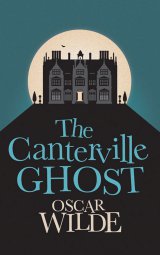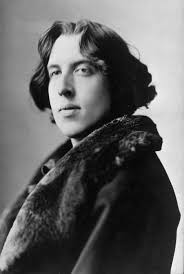The Canterville Ghost Page #3
"The Canterville Ghost" is a short story by Oscar Wilde. It was the first of Wilde's stories to be published, appearing in two parts in The Court and Society Review, 23 February and 2 March 1887.
III The next morning, when the Otis family met at breakfast, they discussed the ghost at some length. The United States Minister was naturally a little annoyed to find that his present had not been accepted. "I have no wish," he said, "to do the ghost any personal injury, and I must say that, considering the length of time he has been in the house, I don't think it is at all polite to throw pillows at him,"--a very just remark, at which, I am sorry to say, the twins burst into shouts of laughter. "Upon the other hand," he continued, "if he really declines to use the Rising Sun Lubricator, we shall have to take his chains from him. It would be quite impossible to sleep, with such a noise going on outside the bedrooms." For the rest of the week, however, they were undisturbed, the only thing that excited any attention being the continual renewal of the blood-stain on the library floor. This certainly was very strange, as the door was always locked at night by Mr. Otis, and the windows kept closely barred. The chameleon-like colour, also, of the stain excited a good deal of comment. Some mornings it was a dull (almost Indian) red, then it would be vermilion, then a rich purple, and once when they came down for family prayers, according to the simple rites of the Free American Reformed Episcopalian Church, they found it a bright emerald-green. These kaleidoscopic changes naturally amused the party very much, and bets on the subject were freely made every evening. The only person who did not enter into the joke was little Virginia, who, for some unexplained reason, was always a good deal distressed at the sight of the blood-stain, and very nearly cried the morning it was emerald-green. The second appearance of the ghost was on Sunday night. Shortly after they had gone to bed they were suddenly alarmed by a fearful crash in the hall. Rushing down-stairs, they found that a large suit of old armour had become detached from its stand, and had fallen on the stone floor, while seated in a high-backed chair was the Canterville ghost, rubbing his knees with an expression of acute agony on his face. The twins, having brought their pea-shooters with them, at once discharged two pellets on him, with that accuracy of aim which can only be attained by long and careful practice on a writing-master, while the United States Minister covered him with his revolver, and called upon him, in accordance with Californian etiquette, to hold up his hands! The ghost started up with a wild shriek of rage, and swept through them like a mist, extinguishing Washington Otis's candle as he passed, and so leaving them all in total darkness. On reaching the top of the staircase he recovered himself, and determined to give his celebrated peal of demoniac laughter. This he had on more than one occasion found extremely useful. It was said to have turned Lord Raker's wig grey in a single night, and had certainly made three of Lady Canterville's French governesses give warning before their month was up. He accordingly laughed his most horrible laugh, till the old vaulted roof rang and rang again, but hardly had the fearful echo died away when a door opened, and Mrs. Otis came out in a light blue dressing-gown. "I am afraid you are far from well," she said, "and have brought you a bottle of Doctor Dobell's tincture. If it is indigestion, you will find it a most excellent remedy." The ghost glared at her in fury, and began at once to make preparations for turning himself into a large black dog, an accomplishment for which he was justly renowned, and to which the family doctor always attributed the permanent idiocy of Lord Canterville's uncle, the Hon. Thomas Horton. The sound of approaching footsteps, however, made him hesitate in his fell purpose, so he contented himself with becoming faintly phosphorescent, and vanished with a deep churchyard groan, just as the twins had come up to him. [Illustration: "THE TWINS ... AT ONCE DISCHARGED TWO PELLETS ON HIM"] On reaching his room he entirely broke down, and became a prey to the most violent agitation. The vulgarity of the twins, and the gross materialism of Mrs. Otis, were naturally extremely annoying, but what really distressed him most was that he had been unable to wear the suit of mail. He had hoped that even modern Americans would be thrilled by the sight of a Spectre in armour, if for no more sensible reason, at least out of respect for their natural poet Longfellow, over whose graceful and attractive poetry he himself had whiled away many a weary hour when the Cantervilles were up in town. Besides it was his own suit. He had worn it with great success at the Kenilworth tournament, and had been highly complimented on it by no less a person than the Virgin Queen herself. Yet when he had put it on, he had been completely overpowered by the weight of the huge breastplate and steel casque, and had fallen heavily on the stone pavement, barking both his knees severely, and bruising the knuckles of his right hand. For some days after this he was extremely ill, and hardly stirred out of his room at all, except to keep the blood-stain in proper repair. However, by taking great care of himself, he recovered, and resolved to make a third attempt to frighten the United States Minister and his family. He selected Friday, August 17th, for his appearance, and spent most of that day in looking over his wardrobe, ultimately deciding in favour of a large slouched hat with a red feather, a winding-sheet frilled at the wrists and neck, and a rusty dagger. Towards evening a violent storm of rain came on, and the wind was so high that all the windows and doors in the old house shook and rattled. In fact, it was just such weather as he loved. His plan of action was this. He was to make his way quietly to Washington Otis's room, gibber at him from the foot of the bed, and stab himself three times in the throat to the sound of low music. He bore Washington a special grudge, being quite aware that it was he who was in the habit of removing the famous Canterville blood-stain by means of Pinkerton's Paragon Detergent. Having reduced the reckless and foolhardy youth to a condition of abject terror, he was then to proceed to the room occupied by the United States Minister and his wife, and there to place a clammy hand on Mrs. Otis's forehead, while he hissed into her trembling husband's ear the awful secrets of the charnel-house. With regard to little Virginia, he had not quite made up his mind. She had never insulted him in any way, and was pretty and gentle. A few hollow groans from the wardrobe, he thought, would be more than sufficient, or, if that failed to wake her, he might grabble at the counterpane with palsy-twitching fingers. As for the twins, he was quite determined to teach them a lesson. The first thing to be done was, of course, to sit upon their chests, so as to produce the stifling sensation of nightmare. Then, as their beds were quite close to each other, to stand between them in the form of a green, icy-cold corpse, till they became paralyzed with fear, and finally, to throw off the winding-sheet, and crawl round the room, with white, bleached bones and one rolling eyeball, in the character of "Dumb Daniel, or the Suicide's Skeleton," a rôle in which he had on more than one occasion produced a great effect, and which he considered quite equal to his famous part of "Martin the Maniac, or the Masked Mystery."
Translation
Translate and read this book in other languages:
Select another language:
- - Select -
- 简体中文 (Chinese - Simplified)
- 繁體中文 (Chinese - Traditional)
- Español (Spanish)
- Esperanto (Esperanto)
- 日本語 (Japanese)
- Português (Portuguese)
- Deutsch (German)
- العربية (Arabic)
- Français (French)
- Русский (Russian)
- ಕನ್ನಡ (Kannada)
- 한국어 (Korean)
- עברית (Hebrew)
- Gaeilge (Irish)
- Українська (Ukrainian)
- اردو (Urdu)
- Magyar (Hungarian)
- मानक हिन्दी (Hindi)
- Indonesia (Indonesian)
- Italiano (Italian)
- தமிழ் (Tamil)
- Türkçe (Turkish)
- తెలుగు (Telugu)
- ภาษาไทย (Thai)
- Tiếng Việt (Vietnamese)
- Čeština (Czech)
- Polski (Polish)
- Bahasa Indonesia (Indonesian)
- Românește (Romanian)
- Nederlands (Dutch)
- Ελληνικά (Greek)
- Latinum (Latin)
- Svenska (Swedish)
- Dansk (Danish)
- Suomi (Finnish)
- فارسی (Persian)
- ייִדיש (Yiddish)
- հայերեն (Armenian)
- Norsk (Norwegian)
- English (English)
Citation
Use the citation below to add this book to your bibliography:
Style:MLAChicagoAPA
"The Canterville Ghost Books." Literature.com. STANDS4 LLC, 2024. Web. 22 Dec. 2024. <https://www.literature.com/book/the_canterville_ghost_314>.




Discuss this The Canterville Ghost book with the community:
Report Comment
We're doing our best to make sure our content is useful, accurate and safe.
If by any chance you spot an inappropriate comment while navigating through our website please use this form to let us know, and we'll take care of it shortly.
Attachment
You need to be logged in to favorite.
Log In